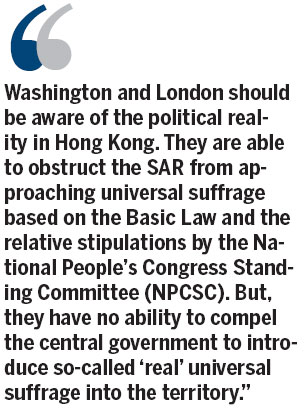Can opposition achieve its goal?
Updated: 2013-10-23 06:31
By Zhou Bajun(HK Edition)
|
|||||||||
Chief Executive (CE) Leung Chun-ying announced at the Legislative Council (LegCo) Q&A session on Oct 17 that the public would be consulted, by the end of this year, on arrangements for the next CE and LegCo elections. The decisive battle between the patriot camp and the opposition camp is officially underway.
The opposition has vowed to win or die. While backing the "Occupy Central" campaign, the "pan-democracy" camp has promoted a set of proposals demanding a thorough reform of Hong Kong's constitutional framework, including public nomination of CE candidates and eliminating all functional constituencies by replacing the "party-list proportional representation" system with the "single-seat, single vote" system. If the opposition camp achieves its goal, Hong Kong will turn from being a part of China into an independent entity.
However, the opposition is unable to do what it hopes. The "Occupy" campaign has been losing public support. A recent poll indicated that the campaign's supporters decreased from 32 percent in July to 25 percent in October, and that those against the campaign increased from 46 percent to 55 percent. Even among the young people of 18 to 29, those who support the campaign were less than those who oppose it by 12 percent.
The business circle usually maintains a neutral or moderate stance towards political disputes. But, as the negative effects of "Occupy" on the territory increased, distinguished local business leaders, such as Li Ka-shing, Henry Cheng Kar-shun, Stephen Ng Tin-hoi and etc., successively criticized or condemned the campaign, stressing the importance of maintaining stability and prosperity in the city.

It is no secret that there are some Western countries behind Hong Kong's opposition. In September, Hugo Swire, minister of state for the British Foreign Office and Clifford Hart, US consul-general in Hong Kong and Macao, separately but concertedly encouraged the "pan-democracy" camp to struggle for "genuine" universal suffrage. And the former even delivered a promise: "Britain stands ready to support in any way we can."
However, it seemed like lip service. Washington and London should be aware of the political reality in Hong Kong. They are able to obstruct the SAR from approaching universal suffrage based on the Basic Law and the relative stipulations by the National People's Congress Standing Committee (NPCSC). But, they have no ability to compel the central government to introduce so-called "real" universal suffrage into the territory.
For Hong Kong, the choice is this: either to reach a compromise on the basis of the Basic Law as well as the relative stipulations by the NPCSC so the city realizes political reform and maintains its international finance, commerce and transportation hubs; or, have no say in the reform, but curb "Occupy" to protect the international financial center from being irreparably destroyed.
Hong Kong certainly couldn't withstand its destruction as an international finance center. Britain and the US, both large stakeholders in the local economy, also couldn't endure the collapse of its financial hub. Although Swire and Hart talked up the business link between Hong Kong and Britain and the US, the two politicians gave priority to the British and US economic interests in Hong Kong.
Currently, the United Kingdom has shown obvious business style in handling its relationship with China. Shortly after Swire's article in local newspapers, Greg Clark, then British financial secretary to the Treasury, came to Hong Kong. He delivered a keynote speech at the third London-Hong Kong Renminbi Forum on Sept 26; and in an article in a local newspaper on Sept 25, he said: "Hong Kong's business environment commands the confidence of investors worldwide, whether from London, Lanzhou or Los Angeles. Over 50 percent of UK investment in Asia is in or flows through Hong Kong. That is a tremendous vote of confidence in Hong Kong by UK companies".
On Oct 15, at the Fifth China-UK Economic and Financial Dialogue in Beijing, both sides inked more deals than at any similar dialogue before. To boost London's RMB offshore market, China agreed to give investors based in the city the right, via the RMB Qualified Foreign Institutional Investor (QFII) scheme, to buy 80 billion yuan ($13.1 billion) worth of stocks, bonds and money-market instruments issued on the Chinese mainland. Reciprocally, the UK agreed to make it easier for Chinese nationals to apply for visas to visit the country and to allow Chinese firms to take major stakes in British nuclear projects.
Logically, putting all the evidence depicted above together, it isn't hard to answer this article's title. No.
The author is a veteran current affairs commentator.
(HK Edition 10/23/2013 page7)